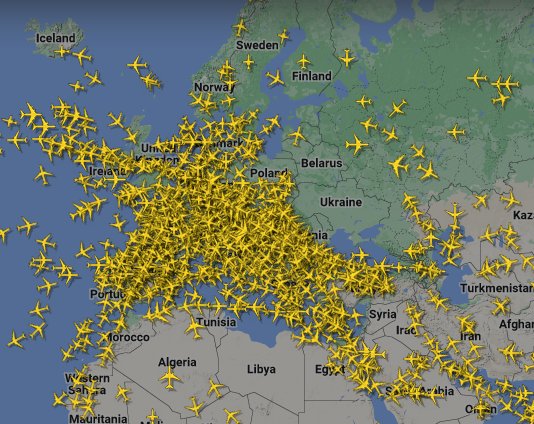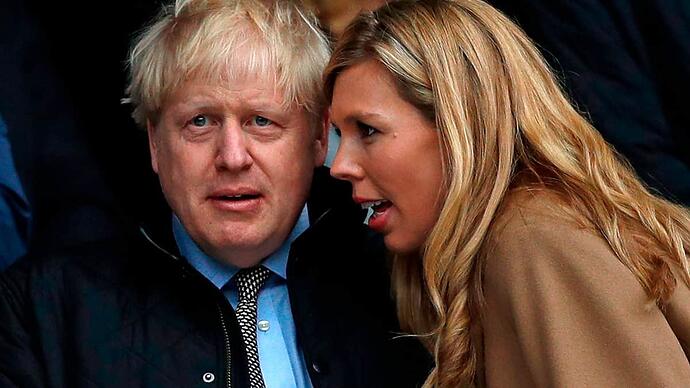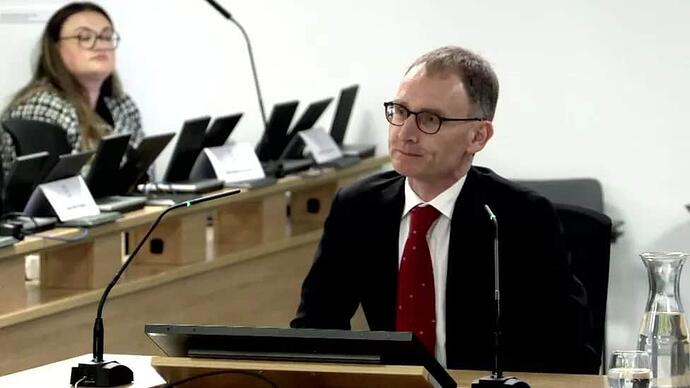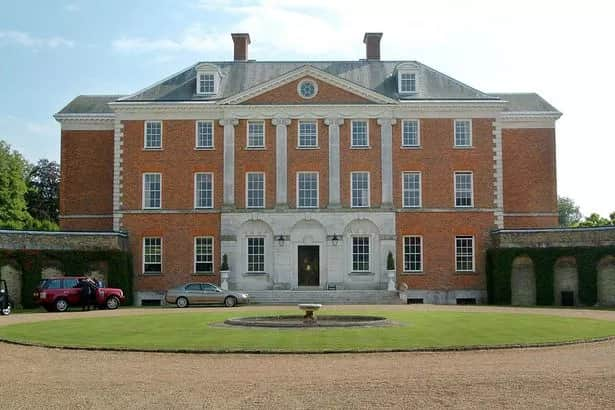Sessions will focus on the response of central government and how ministers and politicians made decisions, as well as how well Westminster worked with the devolved administrations in Scotland, Wales and Northern Ireland.
What will the second round of public hearings cover?
Public hearings will take place across 35 days between 3 October and 14 December.
They will hear evidence about key decision-making in Westminster between early January 2020 and February 2022, when the final Covid restrictions in England were lifted.
The inquiry will look closely at decisions taken by the prime minister and cabinet ministers, and the advice received from civil servants and senior political, scientific and medical advisers between early January and late March 2020, when the first national lockdown was imposed.
Separate work strands will consider these issues from the perspectives of Scotland, Wales and Northern Ireland, with more public hearings held in each nation in January, February and April 2024 respectively.
Decisions made by Boris Johnson, his government and his team of scientists in the early days of the pandemic are to come under intense scrutiny as the second part of the Covid inquiry begins.
Hundreds of articles and books have already been written about the government’s early response to Covid. An investigation by MPs described it as one of the country’s worst public health failures.
The first part of the inquiry, examining just the planning for a pandemic, finished hearing witnesses back in July, with a final report due in 2024.
This second part looks at the decisions made after Covid emerged with “particular scrutiny” of the period until 23 March 2020 when the UK went into full lockdown.
It will ask:
- could different decisions have saved lives?
- if the government’s policy of “following the science” was a fair reflection of what really happened
- whether mandatory lockdowns, face masks and border restrictions really were effective in controlling the spread of Covid
- It will investigate whether the impact on the economy, education and mental health were ever properly considered.
As a public inquiry, Baroness Hallett and her team have specific powers, including the ability to compel witnesses to give evidence under oath, and force the release of documents.
There is significant potential for this to be embarrassing for the government, as it will shine a light on their decision-making, who did what, and what was said behind closed doors.
I hope that the evidence is more than embarrassing - I hope that it damns those who “fiddled while Rome burned” … ![]()
The government’s former chief scientific adviser criticised Boris Johnson’s “impossible flip-flopping” and “bipolar decision-making” in diary entries released to the Covid inquiry. Sir Patrick Vallance also wrote of “chaos as usual” in Downing Street after a meeting on social-distancing.
Sir Patrick served as the government’s chief scientific adviser from 2018 to 2023 and was a familiar face at the podium for Covid news conferences.
Extracts of daily diaries he wrote during the pandemic were read out by the inquiry’s lead counsel, Hugo Keith KC, as part of his opening statement on Tuesday.
In one note Sir Patrick wrote: “Number 10 chaos as usual. On Friday, the two-metre rule meeting made it abundantly clear that no-one in Number 10 or the Cabinet Office had really read or taken time to understand the science advice on two metres. Quite extraordinary.”
In other entries Sir Patrick described how he felt scientists were “used as human shields” by ministers. On 19 September 2020, around the time a possible “circuit-breaker” lockdown was being discussed, he wrote: “[Johnson] is all over the place and so completely inconsistent. You can see why it was so difficult to get agreement to lock down first time.”
Mr Keith also said WhatsApp exchanges between senior officials in Downing Street painted a “depressing picture” of factional infighting and a “toxic atmosphere” during the pandemic. He said messages showed “disharmony” between Number 10 and the Department of Health and Social Care, and contained repeated references to Mr Johnson’s loss of confidence in former Health Secretary Matt Hancock. It appears to be the case that the prime minister and a number of officials and advisers held him in low regard," said Mr Keith. In particular, on account of his apparent tendency to get over-excited and then make stuff up."
Some Prime Minister, some government, some shambles … ![]()
Wales, Scotland and Northern Ireland have their own governments which have different levels of control over their own affairs. Sometimes known as the devolved administrations (DAs), all three had their own lockdown rules which differed more from the UK government’s in England as the pandemic went on.
After initially chairing emergency COBR meetings with the heads of three nations at the beginning of the pandemic, Boris Johnson passed the responsibility on to Michael Gove, the Chancellor of the Duchy of Lancaster. In written evidence to the inquiry Mr Johnson said: “I did chair some of the four nation COBRs, but I was content to let Michael lead.” (1)
Apart from the workload, he said there were “two good reasons” for this, “one of principle and one practical. It is optically wrong, in the first place, for the UK prime minister to hold regular meetings with other DA first ministers, as though the UK were a kind of mini-EU of four nations and we were meeting as a ‘council’ in a federal structure. That is not, in my view, how devolution is meant to work.”
Federalism is where power is more equally divided between central and regional governments. That is not the case in the UK, where ultimate power still lies with the central government in Westminster despite the three devolved nations being permitted to make their own decisions.
Mr Drakeford wrote to the UK government in April 2020 asking for a “regular rhythm” to meetings between the devolved nations and the Westminster government. There was a warning in one meeting of UK government ministers, where Mr Drakeford’s request was discussed, that regular meetings with Wales, Scotland and Northern Ireland could be a “potential federalist trojan horse”.
In her testimony to the Covid inquiry, politics expert Professor Ailsa Henderson of Edinburgh University said there was a “fear of federalism, there is a fear of leaks”, that the UK government perceived a “self-serving nature to the motives of the devolved administrations”. She said the minutes of the meeting of UK government ministers was “the most remarkable document I have read in a number of years”. There was no suggestion, she said, “that it might improve decision-making if more voices from more parts of the UK were included”.
(1) Was that because BJ was still shacking up with Carrie?
What appalling decision-making from BJ and his Tory cronies … 
On a small set if islands like the UK, the non-English constituent nations were told by Tory central government to go their own way while the shambolic BJ cabinet went its way in taking England from crisis to chaos … no WWII “pulling-together” permitted owing to “political considerations” … 
Agree, this was a poor PM and his equally poor government placing petty political considerations and presentations above the welfare of the UK. Which, when stated like that, is truly shocking. But on reflection, given that we are talking about Johnson, not really that surprising.
The screenshot of the WhatsApp group chat from autumn 2020, provided by Mr Cummings, was displayed on screen during a session in which the senior lawyer for the inquiry, Hugo Keith KC, was drawing attention to what he called “dysfunctionality” at the heart of government.
Lee Cain - Mr Johnson’s head of communications - asks Mr Case what “are we talking about”.
“Whatever Carrie cares about, I guess,” replies Mr Case. “I was always told that Dom [Cummings] was the secret PM. How wrong they are. I look forward to telling select [committee] tomorrow… don’t worry about Dom, the real person in charge is Carrie.”
Mr Cain agrees and adds that “she doesn’t know [what] she is talking about either”.
The messages were sent in autumn of 2020 - around the time the government was reintroducing some Covid restrictions in England.
Carrie Johnson (née Symonds) was in a relationship with Mr Johnson before he became prime minister in 2019. They lived together in Downing Street and married in May 2021.
Mr Keith KC warned the inquiry that “due caution must be applied to the accuracy of WhatsApps which lack nuance and can be intemperate, and also diary entries, which may not accurately reflect the reality of the position day by day and which indeed may have been drafted for a different audience.”
However, he went on to suggest that the messages and other pieces of evidence, including diary entries and notes from Sir Patrick Vallance, demonstrated that factionalism and infighting were prevalent at a time when the government was responding to the coronavirus pandemic.
Mr Keith suggested that: "In the early part of the pandemic, the early months, the dysfunctionality… was reflective of the system, the structures, that were in place.
“Latterly the dysfunctionality lay more in the personalities and their working relationships and indeed the people who were in government.”
Naturally, BJ and his cronies will (later) deny that the government was an utter shambles and its reaction to the COVID pandemic was totally shambolic.
“Listen very carefully. I shall say this only once!”
Prof Ferguson, director of the school of public health at Imperial College London, became a household name in the early stages of the pandemic with his modelling of the spread of Covid and as a member of the expert committee, Sage.
Giving evidence to the inquiry on Tuesday, he said he realised by late January 2020 that the government’s early policy of trying to contain the virus would not be possible with the limited border checks and other measures in place at the time. In an email to chief medical officer Sir Chris Whitty on 2 February, he said it was already “quite likely” the virus had been imported into the UK from China.
Around the end of February he said he knew that the number of hospital cases was likely to overwhelm the NHS without stronger action to reduce transmission. By 10 March he said he was “extremely concerned” about the latest data. He told the inquiry he had been “frustrated” that some government officials had not “comprehended the figures”.
“There was a lack of urgency, let’s put it that way,” he said.
He emailed Ben Warner, a data scientist brought in to Downing Street by Dominic Cummings, asking him to make sure the prime minister was shown graphs with projections of between 4,000 and 6,000 deaths a day “under the strategies being considered”.
“This event is in the natural-disaster category, and the cure (eg massive social distancing, shutdowns) could be worse than the disease,” he said in the email.
Asked why he sent the message, Prof Ferguson said: “It felt uncomfortable, but at the time it felt like it needed to be said. I was increasingly concerned about this disconnect between the numbers we were actually presenting, and the reality of what that would actually look like.”
On 16 March Prof Ferguson and his team published new research suggesting that 250,000 could die without more drastic action. The government started to impose stricter measures around that time.
On 16 March the public were asked to stop all non-essential contact and on 18 March schools were closed, before the full lockdown was announced on 23 March.
BJ and his cabinet were shilly-shallying and dilly-dallying while a storm threatened … ![]()
It’s a pity that the hearing was after the covid pandemic and not before. If people reckon they could have done better, why didn’t they step up to the plate? It’s easy to be an expert after the event.
Well, I could have done better and I said so at the time.
It didn’t take an expert to realise that people, like my brother-in-law, were dying from something that was, at that stage, not understood, highly infectious and out of control, but it did require someone with brains in overall charge of the response - unfortunately all we had was BJ, besotted with Carrie, and a bunch of incompetent cronies making it up on the fly … 

Professor Steven Riley, who worked for Imperial College London at the time of the pandemic, told the UK COVID-19 Inquiry, in his witness statement, that the government should have called the lockdown on 9 March 2020 instead of 23 March.
Prof Riley, who now works for the UK Health Security Agency, said subsequent data had shown that people began to change their behaviour on or around 16 March, a few days before the public was ordered to stay at home.
Asked to elaborate, he told the inquiry: “Once we had lab-confirmed deaths in ICUs [intensive care units] with no travel history, no obvious connections to any out of country social networks (1), even a handful of those would indicate that we would be rapidly progressing in our epidemic.”
(1) Like my brother-in-law
AFAIK, Donkeyman was first to raise a thread about the danger of the then scarcely-known virus:
20 Jan '20 20:10
It ended up with over 5,000 posts.
I think that might just be missing the entire point here. The experts were giving expert advice before and during the pandemic. The government did not heed that advice.
This ruddy probing IMO is a waste of money when there are SO MANY homeless and others housed in completely inappropriate almost derelict old buildings. When are we going to get a government people-centric and not self-centred nest feathers ![]()
Quite … ![]()
Amid criticism that it was too slow to act, the Government now faces claims that Britain was in a poor state of readiness, calls to order protective gear were ignored and its own scientists’ warnings fell on deaf ears.
The Prime Minister is said to have missed the first meeting on January 24, which lasted an hour, and then four more as the virus became a massive threat to the UK.
Mr Johnson attended his first Cobra meeting about the new strain of coronavirus on March 2 - five weeks after the first one - as the UK had about three dozen confirmed cases.
For some of the time BJ was busy with other matters:
Boris Johnson spent nearly two weeks out of the public eye, staying at a taxpayer-funded country mansion with his girlfriend as ministers held emergency meetings on the coronavirus crisis.
As the nation faced the twin crises of flooding caused by Storm Dennis and the rapidly escalating Covid-19 outbreak, the Prime Minister was staying at Chevening, a 115 room lakeside mansion set in 3,500 acres in the Kent countryside.
The Grade-I listed, 17th century mansion is traditionally the country residence of the Foreign Secretary. But the PM stayed there because renovations were being performed on his own grace-and-favour mansion, Chequers.
After chairing the first meeting of his newly reshuffled cabinet on Friday, February 14, he decamped to Chevening with partner Carrie Symonds.
The UK had already raised the threat level of the virus from low to moderate two weeks earlier, after the first two cases were confirmed on British soil - a pair of Chinese nationals who fell ill at a hotel in York.
NHS England had already declared its first “level 4 critical incident” at the end of January.
And there are still many in the Tory party who think he is the best PM since Thatcher and would have him back in No 10 immediately if they could.
Hi
Boris does not do detail, at all, his brain is not wired that way.
He also hates taking decisions.
Very true. He does neither detail nor decision. Nor truth. He does do bombast very well.
That’s what this country needs - more bombast.
Sorry to hear about your BiL Omah…
When was it that Prime Ministers had a clue how the common people live? They are all cut from the same Eton/Oxbridge cloth and are money and power orientated. I bet none of them, past and present, could wire up a simple three pin plug…
I agree that at the first sign of the pandemic we should have lifted the drawbridge and stopped all forms of transport into the UK. I still think that all airports should be closed forever.
Flights now…

How can you possibly consider any forms of pollution control until this has been addressed…
He also hates spending his own money - if he can get something for free then he will, otherwise he will find a “supporter” to pay the bill … of course, he is not averse to rewarding those supporters with positions, titles and government contacts … ![]()
Truth - he doesn’t know the meaning of truth:



